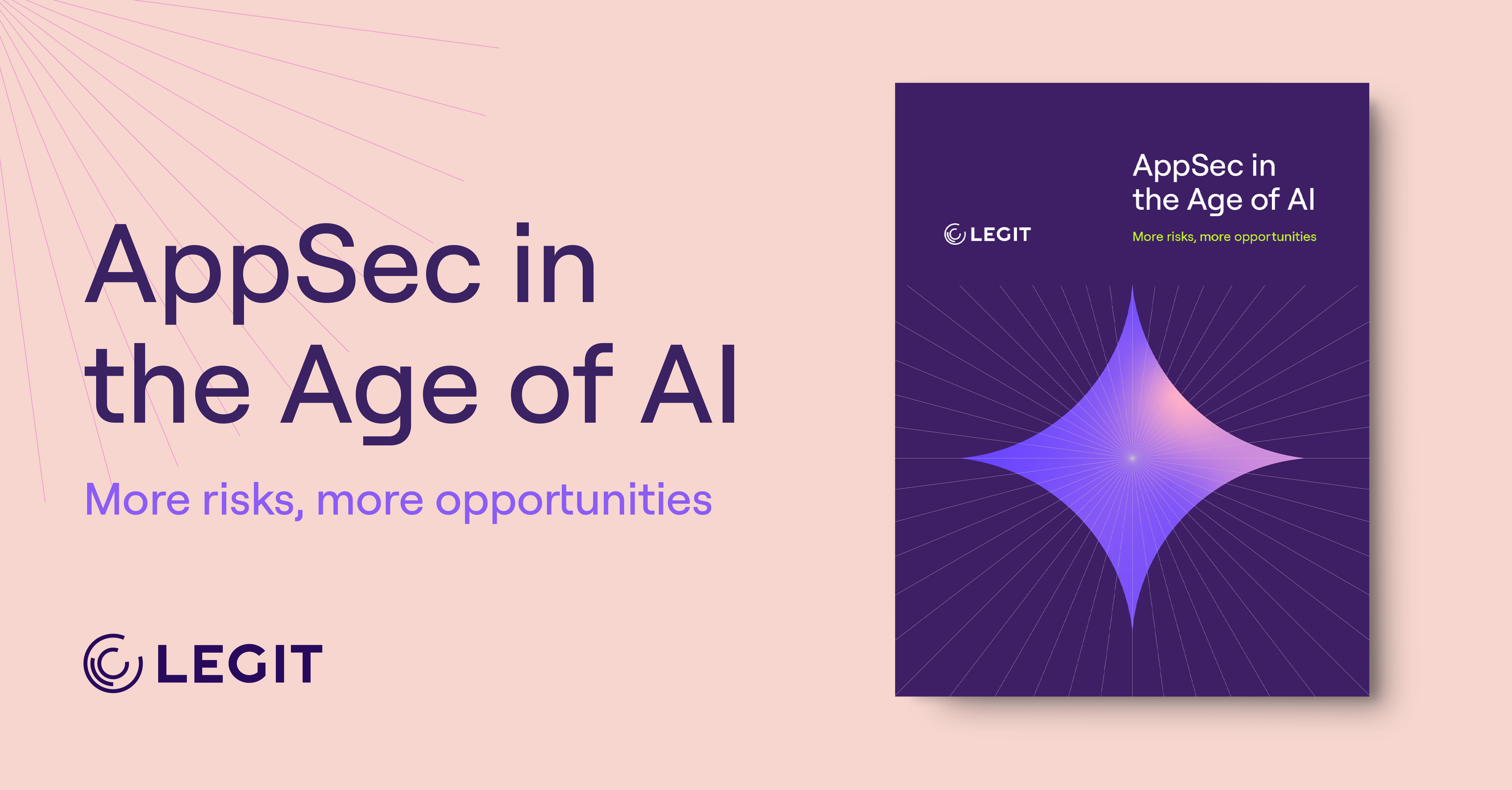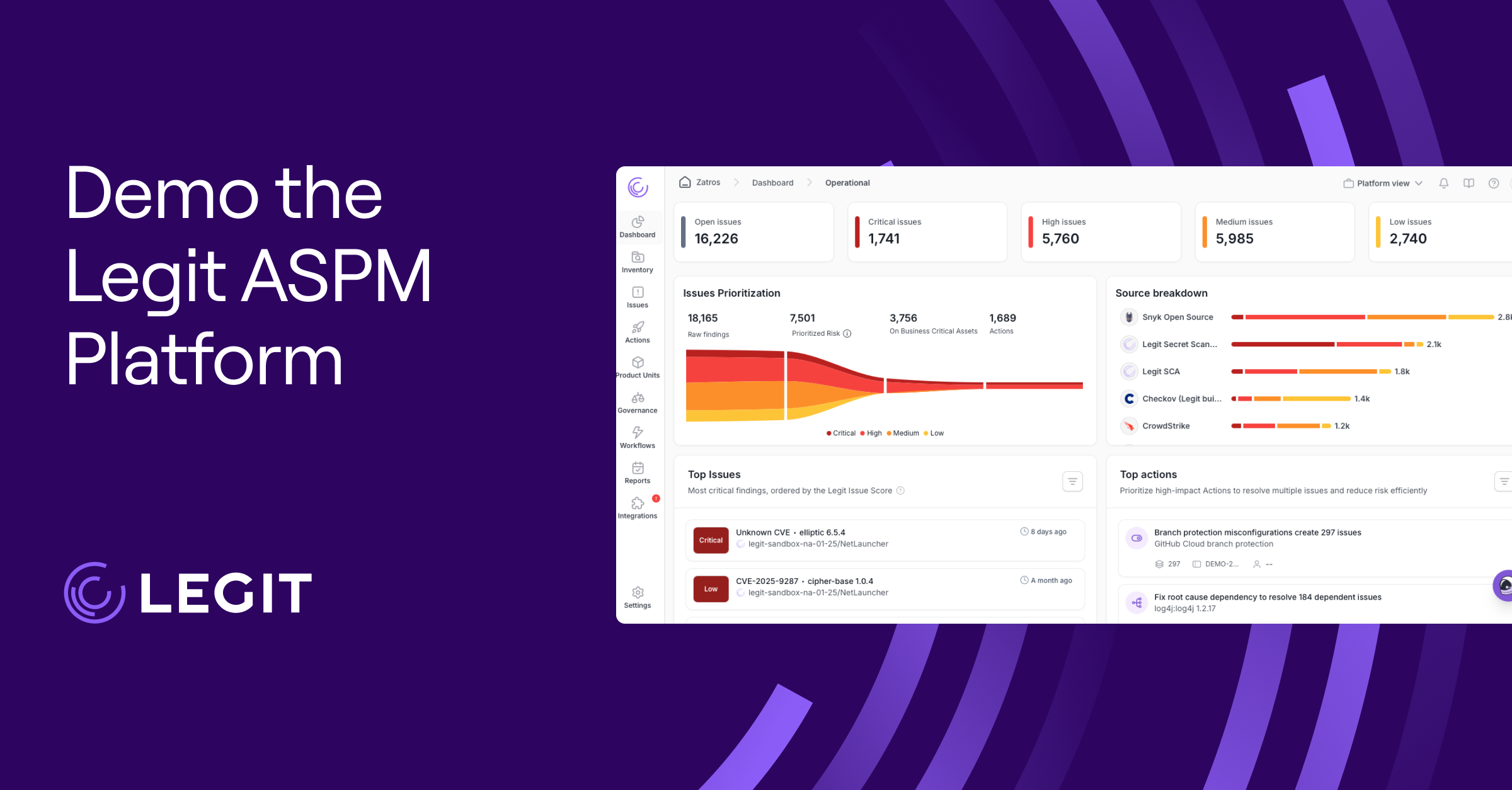DevOps teams are under constant pressure to move faster without causing disruptions. AI helps by automating tedious tasks, spotting real-time inefficiencies, and catching issues before they trigger downtime.
From streamlining CI/CD to fine-tuning infrastructure management across the software development process, AI in DevOps helps teams scale accurately. This article will explore the benefits, real-world use cases, and tools that show how AI changes the DevOps game—and how Legit Security fits into that picture.
The Benefits of AI in DevOps
AI and DevOps are becoming deeply connected, with automation and intelligent systems transforming how teams build and manage software. Using AI in DevOps helps you work smarter at every stage of the SDLC. Here are the benefits:
- Faster, cleaner deployments: AI DevOps workflows reduce delays by automating repetitive tasks like regression testing, code analysis, and pipeline monitoring. Teams can release faster with fewer errors.
- Consistent quality across the board: Using AI in DevOps minimizes human error by enforcing automated, repeatable testing and validation. This keeps quality high even as delivery speeds up.
- Smarter use of infrastructure: DevOps and machine learning (ML) go hand in hand when forecasting demand. AI learns from usage patterns to automatically right-size resources and cut costs.
- Real-time threat detection: AI tools for DevOps can surface risks before they impact production. From anomaly detection to reducing false positives in secrets scanners, AI helps teams focus on what matters instead of wasting time on noise.
- Proactive issue resolution: AI can analyze trends in logs and code changes to surface the root cause of issues faster, strengthening operational awareness and GenAI-based application security as systems become more complex.
- Less noise, more clarity: AI breaks down data silos by aggregating inputs across your toolchain. The result is clearer insights that help Dev, Sec, and Ops teams stay aligned.
Using AI in DevOps: 7 Examples
DevOps and AI are a natural pair. When used together, they streamline releases, boost quality, and give teams more time to focus on what matters.
Here are seven examples that demonstrate the power of AI in DevOps:
1. AI With CI/CD
AI refines CI/CD pipelines by learning from past builds and tests to flag risky changes early, recommend fixes, and even automate rollbacks when issues arise. Some tools also bring AI into continuous delivery by automating complex workflows on Kubernetes.
2. Automate Testing
AI identifies which areas of your codebase are most likely to break and targets them first, reducing noise and speeding up cycles. This approach leads to more efficient QA practices.
3. Monitoring and Anomaly Detection
Traditional monitoring surfaces what’s broken. AI-powered monitoring shows you why. It analyzes historical and real-time telemetry to detect deviations from standard patterns, reducing alert fatigue and helping operations teams act on incidents faster.
4. Intelligent Incident Response
AI classifies incidents, identifies root causes, and suggests next steps based on past behavior. Some tools apply machine learning algorithms to route incidents and kick off remediation workflows to cut resolution time.
5. Smart Resource Management
AI-driven tools analyze traffic, usage patterns, and resource allocation to predict demand. This helps DevOps teams avoid overprovisioning while keeping services responsive, from auto-scaling infrastructure to optimizing cloud spend.
6. GenAI Code Assistance
GitHub Copilot and similar tools use AI to autocomplete functions, highlight potential bugs, and recommend more secure patterns. Rather than replacing your developers, it helps them work faster with fewer errors.
7. AI-Driven Security Analysis
AI enhances security scanning by prioritizing the issues that matter and catching patterns others miss. From identifying leaked credentials to spotting vulnerable GitHub Actions workflows in deployed environments, AI tools are evolving to reduce manual triage and surface actionable risks. Teams using AI to automate security testing with DevSecOps tools also tighten feedback loops and spend less time chasing false positives.
Challenges of Using AI in DevOps
AI can unlock significant efficiencies in DevOps, but it’s not without tradeoffs. These common challenges show where teams often hit friction and what to watch for as adoption scales:
Black Box Problem
AI systems often surface recommendations or actions without clearly showing how they got there. This “black box” dynamic makes it hard to trace the logic behind a failed deployment or a skipped test. When integrating security into DevOps, this lack of visibility makes it even harder to validate decisions or meet compliance requirements.
Skill Gaps
AI in DevOps pulls from multiple disciplines—data science, machine learning, and DevOps security. Most teams don’t have all of that in-house. And when they lack effective cross-functional collaboration knowledge, teams can underuse or misconfigure even the best tools. As more AI tools emerge, the gap between what’s possible and what’s practical will grow if training and hiring don’t keep up.
Quality and Availability of Data
For AI tools to function effectively, they require structured and comprehensive data systems. But DevOps teams frequently encounter fragmented telemetry, isolated metrics, or low-quality logs.
This makes it more difficult for AI to detect anomalies, predict issues, or optimize resources accurately. Data preparation and normalization are equally important as the AI models themselves.
Over-Reliance on Automation
It’s tempting to lean heavily on AI once it's integrated. However, even the most advanced models can miss edge cases or surface false confidence. For example, if AI flags a deployment as healthy based on trends, it might miss new variables outside its historical training data.
Human oversight is key to success, especially for security, compliance, or customer-facing systems tasks. AI decisions need to be assessed for accuracy and business impact.
AI Tools for DevOps
AI tools can transform DevOps from reactive to proactive—predicting problems, optimizing performance, and streamlining delivery without human bottlenecks. Below are a few standout platforms driving that shift forward:
1. Dynatrace
Dynatrace combines observability and AI to deliver precise answers about application performance, user experience, and infrastructure health. Its Davis AI engine explains the root cause and impact, giving teams a clear path to fixing problems before users notice.
2. PagerDuty
PagerDuty automates incident response. Its AI engine evaluates past events to triage new incidents, assign them to the right teams, and trigger workflows. Over time, it learns which patterns matter and adapts its recommendations, reducing noise and time to resolution.
3. Amazon CodeGuru
Amazon CodeGuru reviews code for inefficiencies, concurrency issues, and vulnerabilities. It integrates with your repo and uses machine learning to provide suggestions directly in pull requests, saving reviewers time while raising code quality across the board.
4. GitHub Copilot
Copilot acts like a second set of hands for developers. It suggests context-aware code completions, flags possible bugs, and learns from your coding style to speed up delivery. It's especially useful for completing repetitive tasks or learning unfamiliar frameworks.
5. Testim
Testim enhances Selenium with AI-driven test automation. It builds stable, self-healing tests that adapt to changes in the UI, cutting down maintenance work and helping QA teams scale test coverage without slowing release cycles.
Leverage AI in DevOps With Legit Security
AI is helping DevOps teams move faster, catch issues earlier, and make smarter decisions across the pipeline. From CI/CD optimization to intelligent incident response, the right tools make workflows more efficient without sacrificing quality. But getting value from AI takes visibility and the right balance between machine speed and human judgment.
Legit Security brings AI into DevOps where it counts. The platform analyzes your software supply chain, flags risky code changes, and spots CI/CD misconfigurations in real time. It also helps spot AI usage and identify potential vulnerabilities. Get the context you need to act quickly—without digging through dashboards or slowing down releases. It’s security that keeps up with your velocity. Request a demo today.
Download our new whitepaper.


